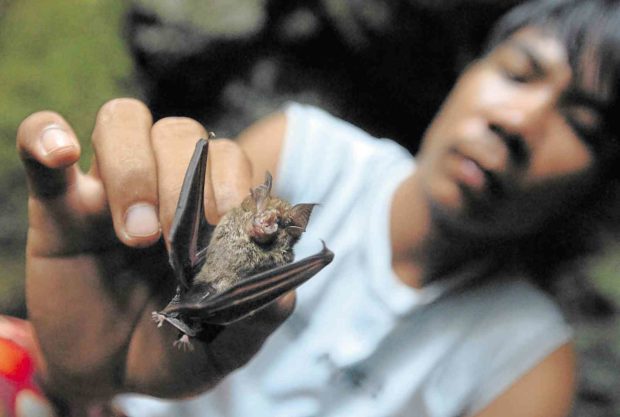Protect Boracay’s fruit bats, group urges environment chief

SAVING FLYING FOX The population of fruit bats, locally called kuyapnit, roosting in the village of Yapak on Boracay Island is dwindling, prompting conservation groups to call for their protection. —LYN RILLON
ILOILO CITY—Conservationists have sought Environment Secretary Roy Cimatu’s help in declaring sections of Boracay Island in Aklan province as a wildlife sanctuary and protected area to save the local population of fruit bats.
In a letter last month, the Friends of the Flying Foxes (FFF) asked Cimatu to ensure the preservation of parts of Yapak village in the northern part of the 1,032-hectare island.
FFF is a group advocating the conservation of the golden-crowned flying fox (Aceradon jubatus), a fruit bat that is endemic to the Philippines but which has been categorized as among the endangered species worldwide under the International Union for Conservation of Nature Red List.
A section of Yapak village that is considered the last remaining forest area on the island serves as a roosting site of flying foxes, so-called because they resemble foxes with wings.
The population of fruit bats has declined mainly due to human activity and disturbance in their habitat, the group said.
Article continues after this advertisementFrom an estimated 15,000 in 1986, the number of bats has dropped to only 2,997 based on the last official count conducted on May 7, 2016, according to FFF letter signed by its president, Julia Lervik.
Article continues after this advertisementJim Sampulna, Department of Environment and Natural Resources Western Visayas executive director, said he had not received a copy of the letter but welcomed the initiative.
According to Sampulna, parts of the area that FFF wants declared as a wildlife sanctuary are owned by private corporations or individuals.
“I don’t know if it can be proclaimed a wildlife sanctuary because it is privately owned. But if it will be donated, we will work for it,” he told the Inquirer.
He said the area could be turned into a wildlife sanctuary through a presidential proclamation if the owners would donate or waive their rights over their property.
“We also do not want the area disturbed,” Sampulna said.
He said Cimatu had directed the regional office to ensure that environmental concerns and issues on Boracay Island would be addressed.
FFF also sent a similar letter to Mayor Ciceron Cawaling of Malay town, where Boracay Island is located.
Malay Councilor Nenette Aguirre-Graf, chair of the town council’s committee on environment, said the local government was working on conservation measures, including an ordinance that declared certain areas around the island as marine protected areas where human activity would be prohibited for two years.
The ordinance, she said, would be implemented next month.
The fruit bats are critical for the ecosystem not only of Boracay but also of Panay Island, FFF said.
Bats perform essential roles in pollinating many plants, including many fruits, and for keeping the insect population under control.
Bat droppings also help fertilize the ground and support plant and tree growth, especially in Boracay’s few remaining forest cover. Some of the fruit bats remain in Boracay every night to feed, but most of them fly to the forests of Panay.
The bats are responsible for dispersing seeds of around 95 percent of the forest in Panay, according to FFF.
Conservationists have been alarmed by a recent incident of Boracay residents who caught, cooked and ate a bat and posted their experience on Facebook.
FFF has also been pushing for a ban on helicopter flights over the bats’ roosting site because these disturb their mating and breeding behaviors.
Lervik said the Puka shell beach should also be protected as more tourists have been drawn to the area due to its natural beauty and pristine beach.
She cited the restaurants and buildings that have been put up near the entrance to the beach.
FFF said the Puka Beach and forest area should be declared a wildlife sanctuary so tourism activities could be “controlled and monitored.”
The group urged Cimatu to stop the issuance of environmental compliance certificates to proposed projects in the area until a biophysical assessment was completed.